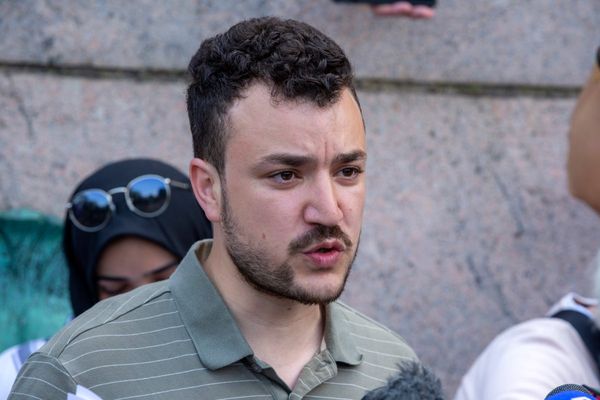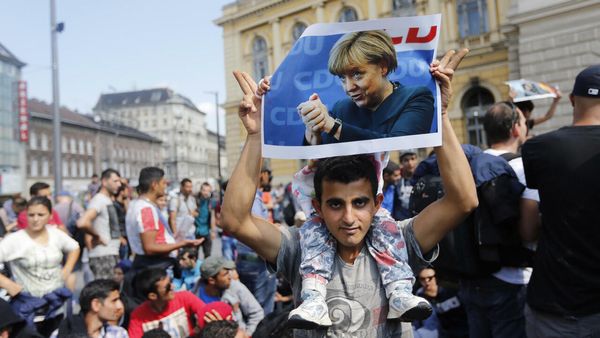
Iran has dropped some of its main demands on resurrecting a deal to rein in Tehran's nuclear program, including its insistence that international inspectors close some probes of its atomic program, bringing the possibility of an agreement closer, a senior U.S. official told Reuters on Monday.
The United States aims to respond soon to a draft agreement proposed by the European Union that would bring back the 2015 nuclear deal with Iran that former President Donald Trump abandoned and current President Joe Biden has sought to revive.
The official, speaking on condition of anonymity because of the sensitivity of the matter, said that although Tehran has been saying Washington has made concessions, Iran has dropped some of its key demands.
"They came back last week and basically dropped the main hang-ups to a deal," the official said.
"We think they have finally crossed the Rubicon and moved toward possibly getting back into the deal on terms that President Biden can accept," the official added. "If we are closer today, it's because Iran has moved. They conceded on issues that they have been holding onto from the beginning."
Iran's foreign ministry had no immediate comment.
Iran had already largely relented on its demand that the United States lift its designation of the Iran Revolutionary Guard Corps as a foreign terrorist organization (FTO) entity, the official said.
"We said under no circumstances would we do that. They continued to push it. A month ago they started to soften that core demand and said you can keep the (FTO) designation but we would like lift it from a number of companies affiliated with the IRGC. We said 'no we're not going to do that,'" he added.
Iran also wanted a guarantee that the International Atomic Energy Agency (IAEA) would close investigations involving unexplained traces of uranium.
"Iran wants guarantees that the IAEA would close all of them. We said we would never accept that," the official said.
The IAEA board of governors in June overwhelmingly passed a resolution criticizing Iran for failing to explain the presence of uranium traces at three undeclared sites.
The official said that gaps remain between the United States and Iran and that "it could take a little longer" to come to a final agreement, if one is possible.
"We’re studying Iran’s response now and we'll get back to them soon," the official said.
Earlier, State Department spokesman Ned Price said there was no guarantee a deal can be struck, saying "the outcome of these ongoing discussions still remains uncertain as gaps do remain."
Washington would have to lift some sanctions under the terms of the agreement, but U.S. officials say returning to the deal is crucial to preventing a nuclear crisis in the Middle East.
"If we get this deal, yes, we do lift some sanctions, but Iran has to dismantle its nuclear program," the official said.
All this comes at a time when Iran is thought to have enough enriched uranium to - if further purified - build multiple weapons, and is closer than ever to being able to produce them, the official said.
The nuclear deal between Iran and world powers appeared near revival in March after 11 months of indirect U.S.-Iran talks in Vienna.
But negotiations broke down over obstacles such as Iran's desire to remove the Revolutionary Guards from the FTO list.
Iran has also demanded the United States guarantee that no future U.S. president would abandon the deal. Biden cannot provide such ironclad assurances because the deal is a political understanding rather than a legally binding treaty.
A second official said that under full implementation of the deal, the IAEA would be able to resume a comprehensive inspections regime that could detect any Iranian effort to pursue a nuclear weapon covertly. Much of this monitoring would remain in place indefinitely.
This official also said Iran would be prohibited from enriching and stockpiling uranium above very limited levels, denying it the material required for a bomb.
In addition, the official said, Iran would not be permitted to have any of the 20% and 60% enriched uranium that it is stockpiling today; advanced centrifuges Iran is operating would be stopped and removed, including all of the centrifuges at its fortified underground facility at Fordow.
"Strict limits on Iranian enrichment would mean that even if Iran left the deal to pursue a nuclear weapon, it would take at least six months to do so," the official said.
(Reporting By Steve Holland and Arshad Mohammed; Editing by Mary Milliken and Gerry Doyle)







